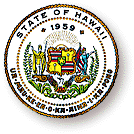Lingle vague
on conditions for
suspending gas-cap law
While still not getting into exact details on what would have to occur before she steps in to suspend the state's gasoline price cap law, Gov. Linda Lingle offered some examples yesterday of what she will look for in deciding whether to act.
 General signs that her administration plans to watch for include disruptions in fuel to emergency service vehicles, shortages of supplies to electric or gas utility companies, and notification of the intent to close from either or both of the state's refineries.
General signs that her administration plans to watch for include disruptions in fuel to emergency service vehicles, shortages of supplies to electric or gas utility companies, and notification of the intent to close from either or both of the state's refineries.
But, for example, if gas pumps went dry in a remote location, Lingle would not say how long she would wait before taking action.
"I'm purposely not answering questions of that specificity because I don't want things to occur just because we're talking about them," Lingle said yesterday in a meeting with Star-Bulletin editors and reporters.
She said if situations such as long lines or shortages were reported, her administration would first verify that the event was occurring and then determine whether it was linked to the gasoline price caps.
"If someone from Molokai calls and says, 'We can't get gas, there are lines,' well, it may not be because of this law," Lingle said. "It may be, as occurred recently, there was just a rumor that the barge wasn't coming.
"That kind of incident is not going to lead me to suspend it, because it's not related to this particular law."
Price caps are scheduled to take effect Thursday. The state Public Utilities Commission set the maximum price this week at which wholesale gas can be sold starting then. The caps are to be adjusted on a weekly basis to reflect changing market conditions.
Preliminary calculations show prices could rise slightly above current levels. The cost for regular unleaded in Hawaii set another new record yesterday, according to AAA's Fuel Gauge Report, which reported the statewide average at $2.85 a gallon yesterday.
Lingle has said she does not believe the caps will bring down the cost of gas.
Under the law, the governor has the power to suspend the caps if they are shown to cause economic hardship or pose a threat to public safety. Lingle noted that to do so, she must provide the Legislature with written notice stating the specific section of the law that is causing the problem and her reasons why she believes the law is at fault.
She countered arguments made by Democrats who have said if the governor does not like the law, she has broad powers to act.
"It's very clear they didn't want a governor, me or anyone, to be able to, just because I felt like it, stop this, or they would've said that," Lingle said.
She said lawmakers appear to be backing off on their support for the law as the implementation date approaches.
"I think it's because it's getting clear that we simply don't know what the impacts might be, and people are now fearful of the potential negative impacts," she said.
Some lawmakers have called it unfair for Lingle to shift the responsibility to the Legislature.
Senate Consumer Protection Chairman Ron Menor has said supporters of the legislation stand by the law, noting that the issue of whether it was needed has been thoroughly vetted in public hearings since 2002, when the first version of the law was passed and signed by then-Gov. Ben Cayetano.
"I continue to support the implementation of the gas cap," Menor (D, Mililani) said recently. "By having a price cap, consumers will at least be provided with the hope and strong possibility of obtaining relief from the excessive gasoline prices they've had to pay, whereas without a cap such relief would not be possible."
Seeds of suspensionExamples of situations that could prompt Gov. Linda Lingle to enact emergency powers to suspend the gas price cap law, as provided by the Governor's Office:
» Major disruptions to gasoline supplies for essential and emergency service vehicles.
Source: Governor's Office
Associated Press
|
www.hawaii.gov/budget/puc/gaspricecaps/
Office of the Governor
www.hawaii.gov/gov/
E-mail to City Desk
[News] [Business] [Features] [Sports] [Editorial] [Do It Electric!]
[Classified Ads] [Search] [Subscribe] [Info] [Letter to Editor]
[Feedback]
